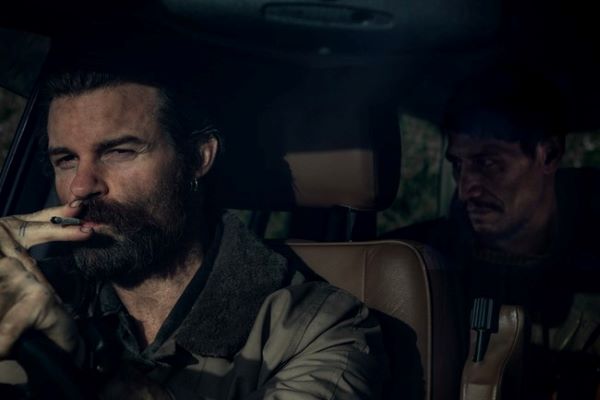James Ashcroft’s punishing thriller Coming Home in the Dark sets itself up a survivalist nightmare right from the off as a family of four hike off into the stunning hills of New Zealand. And a survival thriller it is, just not the kind it first appears to be. An all-too human threat soon dwarfs the potential pitfalls of nature, kickstarting a bloody, shocking evening of ultraviolence and a reckoning with the past. Brutal and tense enough to overcome the bare bones storytelling and a sense of familiarity, it’s an impressive debut.
When Hoagie and Jill (Erik Thomson and Miriama McDowell) and their two sons stop to admire the view and enjoy a picnic, the shadows of two drifters fall across their gathering. Mandrake (Daniel Gillies) is all wiry, loquacious energy. Tubs (Matthias Luafutu) is imposing and silent. Both are psychopaths. One sudden burst of carnage later and the downward spiral begins. But whhile the family appear to be simply victims of awful luck, Mandrake’s questioning of Hoagie’s past suggests method in his madness.
As the title suggests, Coming Home in the Dark dispenses with the panoramic Peter Jackson view of New Zealand in favour of the mood of neo-noir and the iconography of Americana. All endless roads, gas stations and chiaroscuro lighting, it is every inch a midnight movie. Its minimalist approach highlights dialogue, which convincingly hits every register from the captive family; grief, anger, pleading, and rationalising. Gillies is ultimately the star, and further proof that you don’t need bulk to dominate the screen. Like Begbie in Trainspotting, or Ben Mendelsohn‘s Pope in Animal Kingdom, or Daniel Henshall‘s John Bunting in Snowtown, it’s the coiled-spring unpredictability that’s so scary. What makes Mandrake even more terrifying here is that he feels his actions are justified by past traumas; that his pain is a reason rather than an excuse to indulge his nature.
The backstory is drip fed through Mandrake’s cryptic questioning, and occasionally elliptical flashbacks. It implicates Hoagie in terrible events, but in which his sins are of complicity rather than active participation. It’s all part of a game of psychological cat and mouse, in which Mandrake’s serpent tongue tries to pry at the cracks in the unity between Hoagie and Jill, while Hoagie tries to appeal to Tubs to erode the hold that Mandrake has over him. It’s thin flesh over the bare bones, but it’s there none the less, and it’s hugely effective. The question is whether it is more or less frightening to be targeted for a reason, or if you’re simply at the mercy of Funny Games-level randomness?
Using a template that stretches all the way back to Ida Lupino‘s The Hitch-Hiker, Ashcroft’s spartan but relentless thriller feels reminiscent of stripped-back genre calling cards like Duel, Blood Simple, and Blue Ruin. Adapted from a short story of the same name and written with the economy of Cormac McCarthy, its the simplest of narratives directed to within an inch of its life. It stretches its 90 minutes almost past the point of elasticity, leaves a few unanswered questions, and you could even argue that the narrative focus is on the wrong character. But for the most part, what a tough, uncompromising, and exciting ride.
Screened as part of Sundance Film Festival 2021
